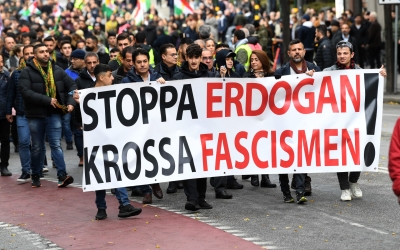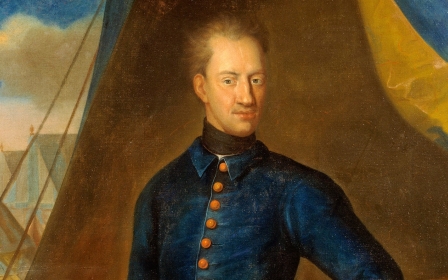Inside the meeting that broke Sweden and Finland's Nato deadlock with Turkey
When Turkey last week signed a memorandum in Madrid to unblock Sweden and Finland’s Nato bid, Ankara’s sudden change of heart elicited much surprise and enthusiasm.
But what the countries' subsequent declarations didn't tell you was that the nearly three-hour negotiations were far from easy, with tensions running high as each leader got increasingly agitated by each other’s tone and stance.
Turkish President Recep Tayyip Erdogan, who just a few weeks ago vowed that he wouldn’t permit Finland and Sweden into the alliance as long as he was in office, began Tuesday's talks in harsh fashion.
'It was a clear win for Turkey. The first time ever they got such recognition'
- western ambassador
He made clear that his participation in the negotiations with his Finnish counterpart Sauli Niinisto and Prime Minister Magdalena Andersson of Sweden was only possible thanks to Nato Secretary-General Jens Stoltenberg’s invitation.
“I wasn’t planning to talk to you,” Erdogan said, according to a source who was present in the room. “I’m here due to my friend Stoltenberg’s insistence.”
New MEE newsletter: Jerusalem Dispatch
Sign up to get the latest insights and analysis on Israel-Palestine, alongside Turkey Unpacked and other MEE newsletters
Turkish officials involved in the technical talks before the meeting were happy with the progress they had made. One senior Turkish official appreciated Sweden’s efforts to amend their laws to combat terrorism more forcefully, even though they predated Turkey’s demands. Yet the political leadership wasn’t satisfied.
Images of PKK flags flown freely in demonstrations on Stockholm's streets and interviews with YPG leaders on Swedish state TV had given Erdogan the jittters. Both Kurdish factions are considered terrorist groups by Turkey. Before the Tuesday meeting, there had even been a debate within Ankara's corridors of power over giving Finland the green light while maintaining that further negotiations with Sweden were needed.
In Madrid, negotiators saw little sign of a conciliatory approach, as Erdogan used his opening remarks to repeat his red lines: the PKK being allowed free rein in Swedish and Finnish cities; suspects linked to the group not being extradited; and aid given to the YPG. Both countries were still blocking arms exports to Turkey, he noted.
Erdogan’s tone agitated the Nordic leaders, who complained that the Turkish president had been too harsh to them.
“We respect your red lines, but what about other states, do they show the same sensitivity? We are bothered by this tone,” one of the Nordic leaders reportedly said, referring to the fact that other Nato states still provide material and financial help to the YPG.
The United States and some Nato states have worked closely with the YPG to combat the Islamic State group since 2014, a move that substantially undermined Ankara’s trust in its western allies.
Erdogan responded by saying that Finland and Sweden’s Nato membership was not a birthright but a privilege, so they don’t set the rules.
“I want you to abide by our red lines,” Erdogan repeated, bringing the negotiations to a stalemate.
Sources said one fundamental disagreement was whether the YPG and the movement of Fethullah Gulen, which is accused of being behind the 2016 Turkish coup attempt, should be designated as terrorist groups.
Sweden and Finland refused to recognise them as such, and then the parties took a break to contemplate.
"And then we had a coffee break and, as always, during the coffee break, great ideas come up and then in the end, towards the end of the meeting, it was easier to come to the conclusion," Finland's Foreign Minister Pekka Haavisto told Reuters in an interview last week.
The solution was put forward by Turkish intelligence chief Hakan Fidan, who said Erdogan wouldn’t sign a deal unless Sweden and Finland made clear commitments on the YPG and the Gulenists.
“Instead of designating them as terror groups, both countries clearly said in the text of the memorandum that they would not provide support to these specific groups, which broke the deadlock,” said a source.
Nato grumbling
In the end, Erdogan and the Turkish leadership were happy to have the YPG and Gulenists referenced in such a way for the first time in an international memorandum signed by western states. “It was a clear win for them,” one western ambassador said.
“The first time ever they got such recognition.” Ankara is planning to repeat the trick by making sure the groups are referenced in the official Nato ascension process as well.
Yet there was still some grumbling within Nato. Turkish sources claimed that the US government wasn’t totally happy with the resolution reached, even though Washington was relieved that Turkey had decided to unblock the Nordic countries' application.
“US officials have criticised Finland and Sweden for not resisting enough against citing YPG and Gulen in an official document as groups not to be supported,” one Turkish official said.
“They were clearly bothered. But the Finns and Swedes explained that there was no other way to break the stalemate.”
This article is available in French on Middle East Eye French edition.
Middle East Eye delivers independent and unrivalled coverage and analysis of the Middle East, North Africa and beyond. To learn more about republishing this content and the associated fees, please fill out this form. More about MEE can be found here.





